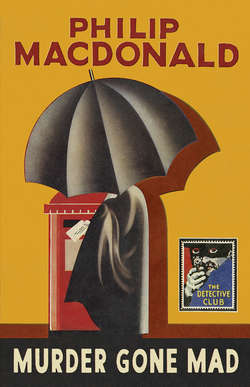Читать книгу Murder Gone Mad - Philip MacDonald - Страница 16
ОглавлениеCHAPTER V
I
PARALLEL with the long platforms of Holmdale station, upon The Other Side of the railway line, runs, for two hundred yards, the thousand-windowed, green-and-white-painted back of the Breakfast Barlies Factory. At the southern end of the building there shoot into the sky, sudden and massive, the four great grain-elevators. These terrific towers are considered, by many of Holmdale’s citizens, to be the one blot upon Holmdale’s beauty. Actually they are the strongest claim to beauty which Holmdale has—their grouping; their smooth, sleek, immutable strength; their unbroken and unvarying shape; their almost brutal utilitarianism: all these—and something else; some indefinable and inner meaning not to be understood even by their makers—make them worthy to succeed the great trees which once stood where now the towers stand, but which, if still they grew, would seem shrubs clustered untidily about the towers’ feet.
They stood now, these towers, a black mass against the bloodshot sky of a winter sunset. The thousand-and-one windows of the factory sprang from blackness into golden life. Behind them the work went on. Good honest grain, ton upon ton of it, was being beaten and thrashed, roasted and split, drenched and besugared until, behind the gleaming windows at the northern end of the building, its final and tasteless distortions were packed, by white-clad females, into blue-and-white cardboard boxes, bearing all, in letters of red and gold, the words Breakfast Barlies. Under the splendid insignia was a picture of the factory, the grain-towers omitted. Under the picture were the words: ‘Breakfast Barlies beat the band, with cream and sugar they are grand; Dad likes them, so does little Pete, no meal without them is complete.’
There were seven hundred and seventeen day-workers in the factory. They were all well paid, well tended and worked under conditions almost painfully hygienic. They started work—girl-packers, men-machinists, roasters, clerks, porters, managers; everyone—at eight a.m., and they finished work—again all of them—at five p.m. Save upon most unusual occasions, and then only when armed with an official permit, signed and countersigned and franked again, was a worker seen to leave the factory before the proper time. But it was only ten minutes past four when Albert Calvin Rogers, second electrician in the belt-room, came up the stairs from the belt-room whistling, with hands in his overall-pockets and cap over one ear.
Albert Rogers was a competent working electrician hating electricity. Albert Rogers was a brilliant player of Association Football, loving the game with a devouring love. And in a pocket of the trousers beneath his overalls there lay a letter signed ‘Yours faithfully, F. T. Lovelace.’ This letter had come by the previous morning’s post and had been in the pocket or his hand ever since. Thirty-six hours and more he had had it; but it had taken every minute of those hours and all the assurances of the many to whom the letter had been shown, to convince him that the letter was fact and no imagining.
But now he did believe it. Hence the small scene, most dramatic, which had taken place in the belt-room ten minutes before. He had, as most workers, often mentally dramatised the visionary occasion upon which he would tell his immediate superior what he thought of him, but never—not at least, until just now—had it occurred to him that such an occasion would ever befall him in reality.
Yet it had. And down there was Masters, the foreman, with a flea in his ear and the other ear beginning already to thicken. And here was he, an hour before knocking-off time, coming up, by the forbidden stairs, a free and melodious man.
Sergeant Stelch, the Commissionaire, came out of his cubby-hole in resplendent wrath. In all the five-year history of Breakfast Barlies, Stelch had never before seen any one of the belt-room staff come up the Directors’ stairs nor heard an electrician whistle. The sight of the one added, in the same person, to the sound of the other, had at first amazed Sergeant Stelch and then infuriated him.
‘Oy!’ bellowed Sergeant Stelch.
Albert Rogers halted. He turned and his wide smile added fuel to the other’s wrath. ‘If you speak a little louder,’ said Albert Rogers, ‘a fellow might be able to ’ear you.’
